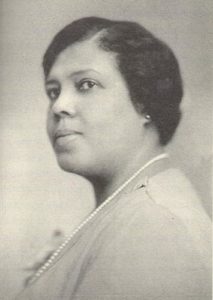
Daisy Lampkin
*Daisy Lampkin was born on this date in 1884. She was a Black suffragist, civil rights activist, administrator, and community leader.
Daisy Elizabeth Adams was from Washington, D.C. She was the daughter of George Adams from Virginia and Rose Proctor from Charles County, Maryland. Her grandparents were Joseph Jenifer Proctor and Elizabeth Swann, free persons of color. After completing her formal education in the Reading, Pennsylvania public school system, she relocated to Pittsburgh, Pennsylvania, where she married William Lampkin, a restaurateur in the Pittsburgh suburbs.
During this time, Lampkin developed her passion for social justice and civic engagement. Those issues that initially resonated with her were connected to her life as a Black housewife in America. Motivated by the early 20th-century women's movement, Lampkin began hosting local suffragette meetings at her home in 1912. After relocating within the city limits of Pittsburgh, Lampkin became increasingly involved in the local leadership of the women’s movement. She joined the New Negro Women's Equal Franchise Federation, later renamed the Lucy Stone League. Lampkin’s early career as a suffragette included assembling street-corner speeches and organizing other Black housewives to engage in consumer groups actively.
In 1915, her leadership and oratorical ability earned her the Lucy Stone League president position, a post she maintained until 1955. During this time, Lampkin also joined the national framework of the black women's club movement. Her leadership here introduced her to circles within the federation of women's clubs, the National Association of Colored Women (NACW), where she served as National Board Chairwoman. During this period, she developed collegial friendships with leaders such as Addie W. Hunton, Mary Church Terrell, and Charlotte Hawkins Brown. Still, her most noted partnership would come through her association and friendship with Mary McLeod Bethune, with whom she would later assist in founding the National Council of Negro Women (NCNW) in 1935.
Lampkin’s effective skills as an orator, fundraiser, organizer, and political activist guided the work being conducted by the National Association of Colored Women (NACW); National Association for the Advancement of Colored People (NAACP); National Council of Negro Women and other leading civil rights organizations of the Progressive Era. For over thirty years, she was a passionate member and officer of the NAACP. She served as an officer for three consecutive terms. Lampkin began as a regional secretary (1930-1935), served as the national secretary (1935-1947), and was a member of the board of directors (1947-1964).
Lampkin increased membership and gave speeches throughout the United States. In addition, she continued to rally for voting rights, becoming vice-chair for both the Colored Voters Division of the Republican Party and the Negro Voters League of Pennsylvania. Lampkin suffered a stroke in 1964 and retired to her home. That same year, she was honored with the Eleanor Roosevelt-Mary McLeod Bethune World Citizenship Award from the National Council of Negro Women for her dedication to racial and gender equality.
Daisy Lampkin passed away on March 10, 1965.